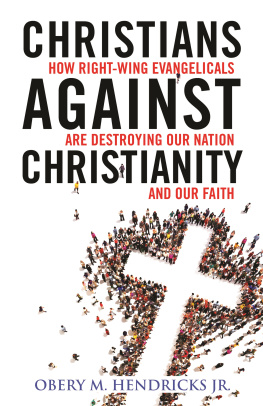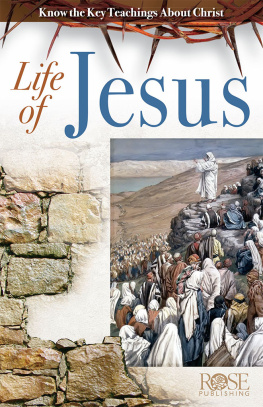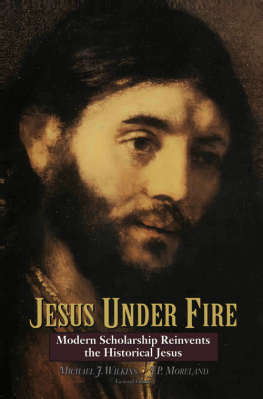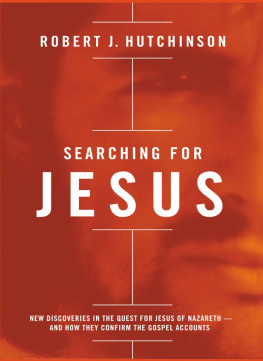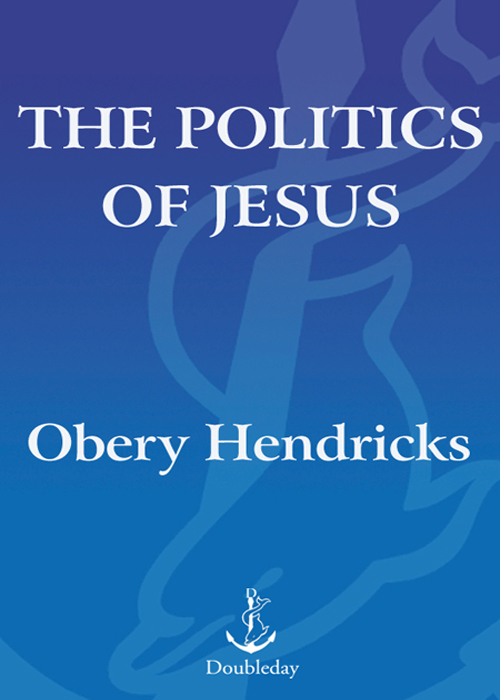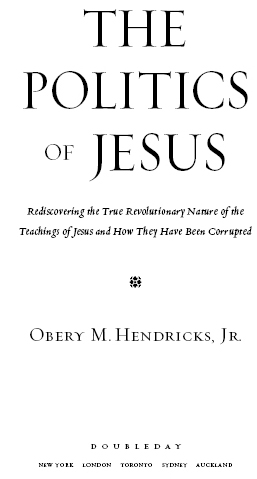MANY THANKS to the scholars whose ideas and insights have so influenced my own: Howard Thurman, whose 1949 classic, Jesus and the Disinherited, prefigured liberation theology and the liberationist readings of the Gospels that have followed; Clarice Martin, the wonderfully insightful seminary professor who convinced me to pursue doctoral studies when my internalization of Americas historical estimation of those of my race and class had convinced me that I could not; Richard Horsley, Ched Myers, and Walter Wink, groundbreaking biblical scholars and dedicated social activists all, who opened my eyes to the politicality of Jesus and whose work I humbly build upon; the late J. Christiaan Beker, the Mad Dutchman of Princeton Theological Seminary, my dear friend and mentor, who taught me that biblical scholarship is, indeed, a ministry; my brilliant friends and doctoral advisors John Gager and Elaine Pagels, who continue to model what it means to be a gracious teacher; James H. Cone, whose God of the Oppressed taught me that God does indeed take sides; Toni Morrison, whose kind words (you write well, Obery) unleashed my pen; and Cornel West, whose seminal book Prophecy Deliverance! continues to influence my work, and whose deep humanity and revolutionary Christianity have exemplified for me and so many others what it means to treat the peoples needs as holy.
INTRODUCTION

My Personal Journey: How I Came to Know Jesus the Political Revolutionary
I T SEEMS THAT all my life I have been on a quest to understand Jesus.
I am a son of the Christian Church. Raised in the Church. Nurtured in the Church. I joined the childrens choir at the age of five. Offered my life to Christ when I was ten. My maternal grandfather was a Presbyterian elder, two uncles were Baptist preachers, three were deacons. My devout father was a longtime church trustee and my mothers Christian witness was so respected that in her later years my childhood church bestowed upon her the honored title of Mother. My family never missed a Sunday service unless my sister or I was sick or we were on one of our regular pilgrimages Down South (the only trip my family ever took).
I was raised on the bland Jesus of Sunday school and of my mothers gentle retellings, the meek, mild Jesus who told us, in a nice, passive, sentimental way, to love our enemies, and who assured us that we need not worry about our troubles, just bring them to him. He was a gentle, serene, nonthreatening Jesus whose only concern was getting believers into heaven, and whose only transgression was to claim sonship with Goda fact so obvious to my family that we were sure even a blind man could see its truth.
That was the Jesus I knew. Reinforcing that perception were the renderings of him in my church, in my own home and the homes of relatives and friends, even in the images adorning the little cardboard fans we used to swat away the sweltering heat at the height of worship: Jesus with his head meekly tilted, soft hands bent limply at the wrist or clasped tightly in prayer, eyes downcast or beatifically turned upward, but never so bold as to look anyone in the eye. Then there was the famous blue-eyed Jesus by Warner Sallman, the most popular and most fanciful image of him (which I, like most folks I knew, thought to be the exact likeness of the Lord). The Scandinavian features and the clipped beard and carefully coiffed blond curlsnot to mention the piercing blue eyesgave Sallmans Jesus a nobility that assured all who gazed upon him that the last thing he would do was cause trouble or upset anyones day. Anyone except a few mean, greedy Pharisees (whom we children hated without having a clue to what a Pharisee was) and evil priests who certainly deserved it anyway. I prayed to that Jesus daily, called out his name in times of trouble, loved him because he first loved me and because he gave his life so the devil would not get my soul.
Yet for all my trust and love and fervor, something in the portrayals of Jesus and his message did not seem quite right; something just didnt make sense. Was this meek, mild Jesus the same Jesus who defiantly called the Pharisees a brood of vipers and described them as whitewashed tombs full of every unclean thing? Was this the same outraged Jesus who, swinging a fearsome stick, set the Temple money changers to flight? And if he was so meek and mild, how could he get anyones interest in the first place, much less hold the attention of thousands at a time and effortlessly get tough guys to follow him, like the apostle Peter, who was so rough and blustery that he was nicknamed Son of Thunder? And what did Jesus mean by sayings like I have come not to bring peace, but a sword? I tried my best to understand, although questions like these were frowned on by my parents and every believer I knew as evidence of weak faith or, worse, of the devils confusion.
As I arrived at puberty and was allowed to wander my neighborhood more freely, I began to hear of a more assertive Jesus. I dont mean the scary, vengeful Book of Revelation Jesus who the fire-and-brimstone preachers claim will burn up everyone except the Electthat is, them and the other fanatics who think like them. Rather, it was the brave, bold Jesus that was proclaimed by the lofty old Garveyites I encountered in the barbershop; or by scary-looking men with huge Bibles dressed like ancient Hebrews; or by unsmiling exhorters beneath stiff red fezzes with black tassles, pontificating on street corners; or by self-taught scholars in white shirts and narrow ties selling furiously annotated self-published books claiming that Jesus divinity was nurtured in a childhood spent not in Nazareth but in Africa or Tibet. All those sincere zealots proclaimed another Jesus. In their various ways they spoke of a courageous Jesus who was executed not because of bowed-head, clasped-hands religious pronouncements, but because he stood ramrod straight against the oppressive political forces of his day.
But black Christians can be some of the most religiously conservative people in America. My parents certainly were. Like everyone else in my world, it seemed, they knew only a long-suffering Jesus who was concerned with the things of heaven, with little thought for the matters of this world, matters like social injustice, racial and gender inequities, or the systematic oppression of the poor. Not even my parents wholehearted support of the civil rights movement and its calls for biblical justice affected their traditional view of Jesus. So when I began to voice my questions and to repeat the things Id heard, my parents, worried that this new Jesus would befuddle me and undermine my faith, explained to me that those passionate, unorthodox preachers


